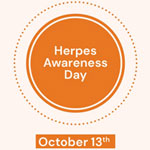National Herpes Awareness Day Date in the current year: October 13, 2026
 National Herpes Awareness Day is observed annually on October 13. It was created to raise awareness about one of the most misunderstood and stigmatized infections and destroy the stigma around it.
National Herpes Awareness Day is observed annually on October 13. It was created to raise awareness about one of the most misunderstood and stigmatized infections and destroy the stigma around it.Herpesviruses are a large family of viruses that can cause a wide range of infections of diseases, including chickenpox, shingles, Epstein-Barr infection, and even some types of cancer. However, the term “herpes” is typically applied to infections caused by herpes simplex virus 1 and 2 (HSV-1 and HSV-2).
HSV-1 and HSV-2 are very common and contagious viruses that can be transmitted through any intimate contact. Since intimate contact includes sexual activity, herpes simplex is classified as a sexually transmitted infection. Both types of herpes simplex virus can cause oral or genital infection, but HSV-1 usually causes oral herpes and HSV-2 typically causes genital herpes.
The thing about HSV-1 and HSV-2 is that once you’ve been infected, the virus cannot be completely eradicated from your body. The majority of people exposed to herpes experience the initial outbreak within two weeks of exposure. It can have mild symptoms and thus go unnoticed. After the initial outbreak, most people living with herpes have no symptoms, but they still can transmit the virus during periods of viral shedding.
According to statistics, almost 70% of all people under the age of 50 are infected with HSV-1. HSV-2 is less prevalent but still widespread. Women are affected by genital herpes almost twice as often as men. A CDC study has shown that almost 16% of women aged 14 to 49 have been infected with genital herpes, which is 1 in every 6 women.
Since sexually transmitted infections are often erroneously thought to result from promiscuity, herpes has a lot of stigma associated with it. However, you should keep in mind that a) sexual contact is not the only way of its transmission and b) the infection is so common that you can get infected even in a committed, monogamous relationship simply because your partner doesn’t know they have it. Having herpes is not the end of the world, but it doesn’t mean that you don’t need to seek treatment.
Since an HSV test is not part of standard STI screenings, you should take it if you have had close contact with someone who has herpes and/or experience symptoms such as small blisters and fever. If you do have HSV, you need to undergo treatment to get the virus under control and take measures to lower the possibility of transmission to your sexual partners.
National Herpes Awareness Day was launched by FemiClear, a women-led company that produces over-the-counter treatments for herpes, yeast infections, and bacterial vaginosis. Its main goal is to educate the general audience about the risks and treatment of HSV infections, as well as to dispel the stigma around genital herpes and give people with genital herpes a chance to feel less alone.
There are many ways to observe National Herpes Awareness Day. You can educate yourself about genital herpes, seek treatment if you think you might have it, and spread awareness on social media with the hashtag #NationalHerpesAwarenessDay to encourage conversation and help end the stigmatization of genital herpes.
- Category
- Other Observances
- Country
- USA
- Tags
- National Herpes Awareness Day, awareness days, observances in the United States, oral herpes, genital herpes